New Yorkers Head to the Democratic National Convention
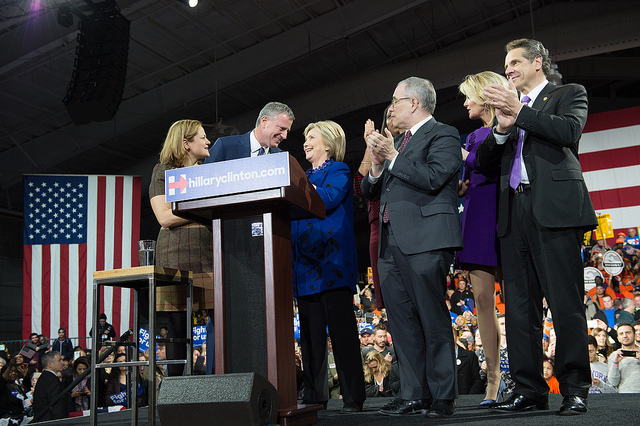
A March Clinton rally in NYC (photo: Barbara Kinney for Hillary for America)
New York is heavily Democratic and the state will have a major presence at this week's Democratic National Convention, not least because its delegation will be seated front and center in the Philadelphia arena because the presumptive presidential nominee, Hillary Clinton, calls the Empire State home. It's a similar dynamic, at least in that last regard, to last week's Republican National Convention, where lifelong New Yorker Donald Trump was formally nominated for President.
One key difference between the two conventions is that New York's elected officials are overwhelmingly Democrats, so the political star power from the state at the DNC will be greater than it was at the RNC. While former Mayor Rudy Giuliani spoke passionately at the RNC in primetime, current Mayor Bill de Blasio is on the speakers' list for the DNC, though it has not yet been announced when he will speak, and The New York Times reported on Sunday that former Mayor Michael Bloomberg will endorse Clinton during a primte-time speech on Wednesday at the DNC. Bloomberg, a Democrat-turned Republican-turned independent, had announced earlier this year that he was not pursuing an independent run for the White House in part because he didn't want to risk taking votes from Clinton and giving the presidency to Trump.
Governor Andrew Cuomo and Senators Chuck Schumer and Kirsten Gillibrand of New York will also speak at the DNC, along with Congressional Reps. Joe Crowley and Nita Lowey. State Senator Adriano Espaillat, who recently won the Democratic primary to replace Charles Rangel in Congress and is expected to easily win the general election, will also speak - Espaillat is poised to become the first person of Dominican descent to join Congress. They lead a large -- 345-member -- New York delegation to Philadelphia that includes other elected officials from Congress to the City Council, party operatives, and others.
While the RNC did feature a number of prominent Republicans from across the country like House Speaker Paul Ryan, Senate Majority Leader Mitch McConnell, and Senator Ted Cruz (who was booed by the crowd for refusing to endorse Trump during his remarks), there were many notable Republicans missing, which fit with Trump's reputation as an anti-establishment political outsider. The Bush family was absent, meaning neither former President George H.W. Bush nor former President George W. Bush (nor former Florida Gov. Jeb Bush, who was a main target of Trump during the Republican primary). Neither 2012 Republican nominee Mitt Romney nor 2008 Republican nominee John McCain was present either.
Unlike Trump’s convention, Clinton’s will feature a "who’s who" of major party names - Democratic National Convention speakers will include President Barack Obama and First Lady Michelle Obama, Vice President Joe Biden, former President Bill Clinton, Senators Bernie Sanders and Elizabeth Warren, and others. Bloomberg will take clear aim at independents and even some moderate Republicans in explaining his support for Clinton over Trump.
One clear theme of the RNC was party unity and while that will be much less of an issue during the DNC, newly leaked emails have led to the resignation of Democratic National Committee head Debbie Wasserman Schultz, who will have a very limited role at the DNC and step down thereafter. The emails showed the DNC favoring Clinton over Sanders during their primary contest. When Sanders speaks Monday night, though, much of the division in the party may be put to rest.
Trump's vice presidential running mate Indiana Gov. Mike Pence accepted his nomination and spoke on Wednesday night of the RNC - this week, newly named Democratic vice presidential nominee Virginia Sen. Tim Kaine will do likewise on the third of the four convention nights. As the Republicans did last week, this week the Democrats will adopt their party policy platform.
As the DNC kicks off there is much to know and to watch for - read more below. The close of the convention will also set off the final three-and-a-half months of the campaign, leading to Election Day on November 8: the final stretch of speeches, platforms, polls, ads, debates, and more.
When and Where is the DNC?
The Democratic National Convention will take place Monday through Thursday, July 25-28, in Philadelphia, Pennsylvania, at the Wells Fargo Center. Though Brooklyn was seriously considered to host the convention amid a strong push from Mayor Bill de Blasio and others, Philadelphia won the honor.
The Delegates
There are three types of delegates for the Democrats: pledged delegates, who petitioned in order to get on the ballot and become a delegate, and are legally bound to support a particular candidate; at-large delegates, chosen by the state Democratic Party, who pledge to vote for a particular candidate; and unpledged delegates, otherwise known as superdelegates, who are prominent party leaders not bound to any candidate.
There is no drama expected at the Democratic convention in terms of delegate allocation as Bernie Sanders has conceded and endorsed Hillary Clinton, so the types of delegates are unlikely to be a factor. Sanders supporters are making noise in the streets of Philadelphia already, and are likely to continue doing so all week, inside and outside the convention hall.
As more signs were pointing to a Clinton win by a solid margin, she won her home state of New York on April 19. Throughout the race, Clinton accumulated an overwhelming majority of the superdelegates, known party insiders always supportive of her over Sanders, who has not been an establishment Democrat. This led to some of the calls from Sanders and his supporters of a ‘rigged system.’ Leading up to the DNC, the conventions rules committee did vote to keep the superdelegate system in place, but also to study that system and very likely adjust it.
The Democratic Party Platform and Speakers
Sanders and his supporters, plus the national Democratic tilt leftward, have had a significant influence on the party platform being adopted this year -- progressive influence throughout the primary season as well as recent, more explicit demands. Three issues are emblematic: calling for a $15 per hour minimum wage, standing against capital punishment in all circumstances, and a vision for debt-free college for all students from families earning under $120,000 annually. The party platform has stepped to the ideological left of Clinton, who has spoken in favor of a $12 federal minimum wage (with states going higher per their judgement) and capital punishment for certain crimes.
Dr. David Birdsell, a professor and dean at Baruch College, does not believe that Sanders’ endorsement of Clinton is enough to dissipate all of the tension within the Democratic Party - and that was before the recent leak, by Wikileaks, of many Democratic National Committee emails, which show that the committee was indeed biased toward Clinton and against Sanders. DNC Chair Wasserman Schultz will have a very limited role at the convention and has announced she is resigning as chair as of week's end.
“The Sanders endorsement – and he did use the word ‘endorse’ – of Clinton will go a long way toward reducing contention and controversy in Philadelphia,” Birdsell said in an interview. “[However,] there will still be some tension; Hillary Clinton is too polarizing a figure to expect an entirely smooth process. But chances are good at this point that Democrats will come together and unite for the fall campaign - barring further repercussions from the FBI’s decision not to prosecute [Clinton, regarding her email scandal], but that’s a general election problem, not a convention problem.”
Sanders will address the convention in prime-time on Monday night, along with First Lady Michelle Obama, and others. Sanders has been saying that his main goal is to make sure that Donald Trump does not become President, and while he has had some kind words for Hillary Clinton, he is likely to focus his remarks more on the dangers that Trump poses to the country and the key issues that he and his supporters have been fighting for.
While Sanders and Michelle Obama are the featured Monday evening speakers, Tuesday evening's big name is former President Bill Clinton. But Tuesday evening will also have a very New York-centric feel, with other speakers including students from Eagle Academy; Joe Sweeney, who was an NYPD detective on September 11, 2001; Lauren Manning, a severely wounded survivor of the September 11, 2001 attacks; and the "Mothers of the Movement" - mothers of men killed in police encounters, which will include Eric Garner's mother, Gwen Carr.
Wednesday's top speakers will be former Mayor Bloomberg, President Obama and Vice President Biden; and Tim Kaine will accept his VP nomination and speak. On Thursday, Chelsea Clinton and Hillary Clinton will speak.
It is not yet clear when Mayor de Blasio, Gov. Cuomo, or Sens. Schumer and Gillibrand will speak.
The New York Angle
Basil Smikle, executive director of the New York State Democratic Committee, is excited about the amendments to the party’s platform. Smikle sees them as an expansion of New York values to the rest of the nation. “I think New York has been in this conversation and led it for a long time,” he said.
“I think the state and the party has had a tremendous impact on the platform itself, and going to the convention with the leadership of the governor is certainly carrying the work that Hillary Clinton has done for New York and the Senate, and what she's been able to accomplish and discuss on the campaign trail,” Smikle continued. “Those are New York values, and we are thankful that they've been able to influence other states, other delegates, and certainly the platform itself."
Cuomo has been selected to chair New York state’s delegation at the DNC - a choice that caused Sanders supporters to protest.
Other notable New York Democratic superdelegates include former President Bill Clinton, Schumer and Gillibrand, and Mayor de Blasio. While Cuomo and de Blasio are set to speak at the convention, it does not look like the same will be true for City Council Speaker Melissa Mark-Viverito, who has been a frequent Clinton surrogate and campaigner this election season and will be part of the delegation to Philadelphia. Mark-Viverito will be active in Philadelphia this week, including an event on Wednesday afternoon with the Latino Victory Project. She is also expected to be on the campaign trail on Clinton's behalf this fall, especially in states like Florida with large Hispanic populations (Mark-Viverito is Puerto Rican and the first Latina to be Speaker of the City Council).
Other members of the New York Democratic delegation to the DNC include Attorney General Eric Schneiderman, Lieutenant Governor Kathy Hochul, State Comptroller Thomas DiNapoli, Assembly Speaker Carl Heastie and a variety of Democratic Assembly members and state Senators; much of the state’s Democratic House delegation; city Public Advocate Letitia James; city Comptroller Scott Stringer; Queens Borough President Melinda Katz; Manhattan Borough President Gale Brewer; Bronx Borough President Ruben Diaz Jr.; and City Council Members Jumaane Williams, Vanessa Gibson, Corey Johnson, Richie Torres, Ydanis Rodriguez, and others. (A complete list of the 345 New York DNC delegation is available here, courtesy of the State Democratic Committee.)
According to Smikle, this year’s delegation “brings a tremendous sense of pride for us as New Yorkers.” He cited work New York leaders have done to move progressive policy and their impact on national politics.
“I think what New York broadly and the delegation specifically brings is that a lot of what's in the platform has been discussed and implemented in New York for quite some time, so I do think members of our delegation have had an incredible impact,” he said.
***
by Amanda Sherwin, Rebecca Oh, and Ben Max
@GothamGazette
Super PAC Begins Flyering Bronx Senate Race
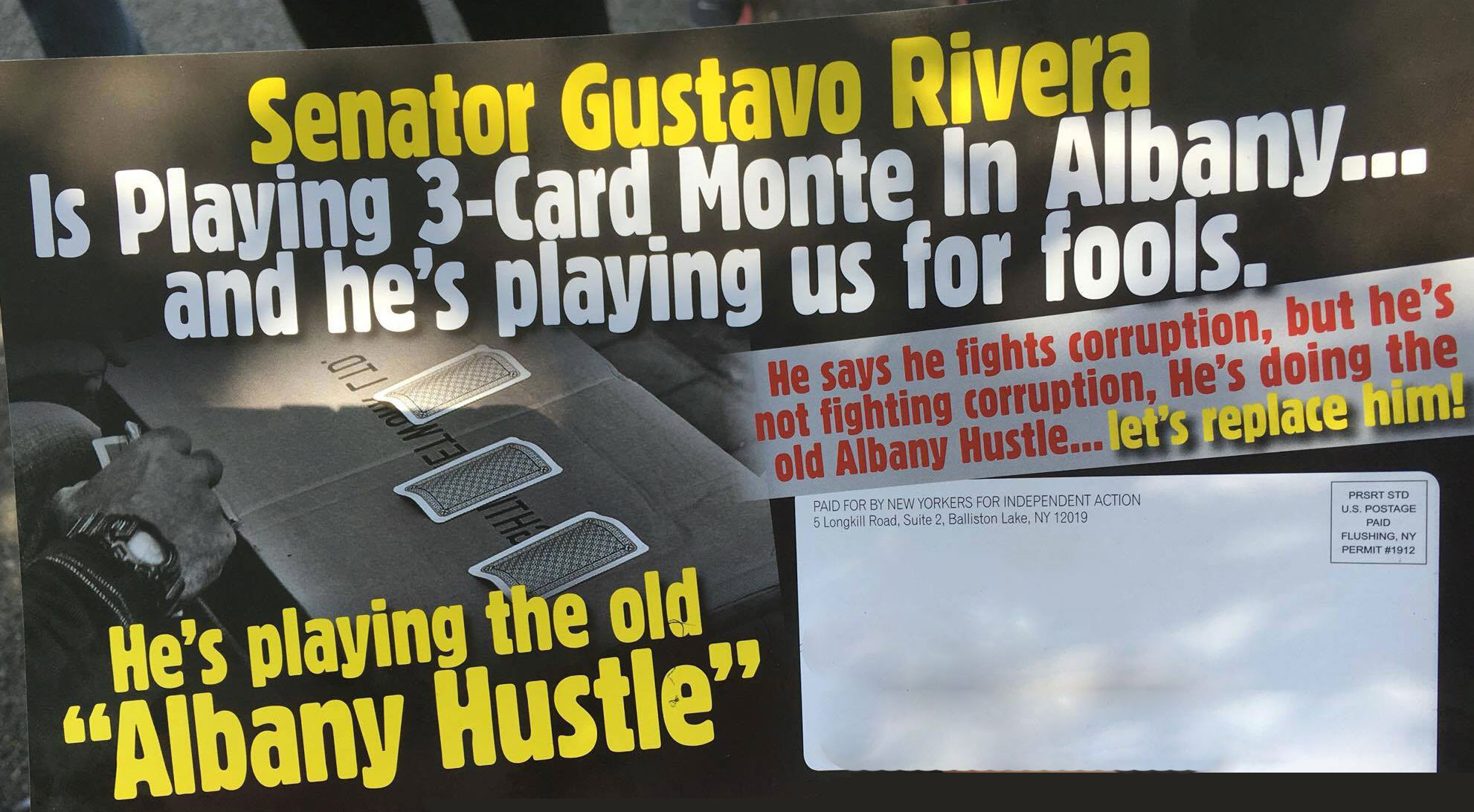
A super PAC has started to blanket the 33rd Senate District in the Bronx with mailers attacking incumbent Democratic state Senator Gustavo Rivera and praising his challenger, Democratic City Council Member Fernando Cabrera. A flyer sent to voters last week praises Cabrera for standing up for family values and for knowing that “single women, mothers and our wives need protection.”
Flyers sent this week accuse Rivera of “Playing Us For Fools” and excerpts heavily from the June 21 New York Times editorial, “The Old Albany Hustle,” which criticized Gov. Andrew Cuomo and legislative leaders for failing to enact any meaningful ethics reforms this year.
Rivera has advocated for the very ethics reforms the editorial accuses the governor and majority leaders of avoiding and Rivera is part of the Democratic minority in the Senate that has no power at the negotiating table. Cabrera and Rivera will face off for the second consecutive cycle during the September 13 primary.
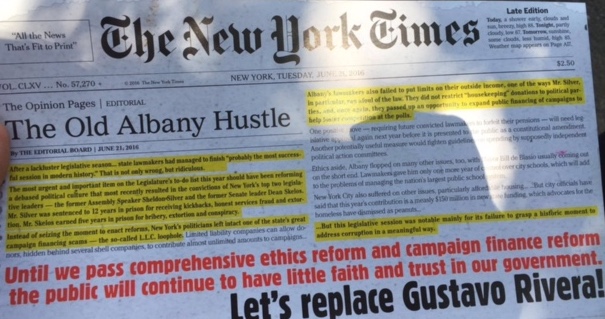 “I think it's ridiculous and laughable on its face,” Rivera told Gotham Gazette. “But it is a deceiving piece. The New York Times article does not have my name in it, but it is an editorial I agree with 100 percent. We should have done more on ethics. Ethics reform is the reason I came to the Senate, it is the reason I ran against a corrupt senator. I’ve been fighting for reform since the second I got to Albany.”
“I think it's ridiculous and laughable on its face,” Rivera told Gotham Gazette. “But it is a deceiving piece. The New York Times article does not have my name in it, but it is an editorial I agree with 100 percent. We should have done more on ethics. Ethics reform is the reason I came to the Senate, it is the reason I ran against a corrupt senator. I’ve been fighting for reform since the second I got to Albany.”
New Yorkers For Independent Action, the PAC paying for the mailers, is advocating for the education tax credit that would see the state give tax rebates to individuals and companies who donate to private, religious, and charter schools. Teachers unions say the measure basically acts as a backdoor to vouchers and will be taken advantage of by companies and the wealthy; while proponents say it boosts educational choice.
Cabrera lost his primary challenge to Rivera two years ago by 20 points and according to a number of sources he promised members of the Bronx Democratic Committee not to run again and to work with Rivera. However, many Democrats see the financial backing of NYIA as the impetus for the repeat challenge.
The PAC has reported taking in $2.7 million since its creation and has spent over $1 million on polls and research on different races. The New York Daily News reported earlier this month that the PAC is targeting Rivera as well as Assembly Democratic incumbents Pamela Harris of Brooklyn, Phil Ramos of Suffolk County, and Latrice Harris of Brooklyn.
Major donors include Wal-Mart heiress Alice Walton, who gave $450,000, and Peter Grauer of Bloomberg L.P., who gave $75,000. The PAC also has major support from Catholic activists.
 Cabrera has proven a controversial figure in the City Council for his support of Ugandan anti-gay laws and his association with anti-gay group The Family Research Council. Cabrera’s run is not insignificant in a year when Senate Democrats are banking on the presidential election to help them seize the majority from Senate Republicans. Rivera, who would have otherwise spent the summer campaigning for other Democrats, is now forced into a costly primary.
Cabrera has proven a controversial figure in the City Council for his support of Ugandan anti-gay laws and his association with anti-gay group The Family Research Council. Cabrera’s run is not insignificant in a year when Senate Democrats are banking on the presidential election to help them seize the majority from Senate Republicans. Rivera, who would have otherwise spent the summer campaigning for other Democrats, is now forced into a costly primary.
Cabrera reported raising $72,015 in his July filing with the state campaign finance board and spending $47,549 -- he now has $24,315 to spend. Many of his donations came from the real estate industry. Rivera reported raising $139,486, while spending $79,299; he has $114,012 to spend. Rivera took a significant number of contributions from beer distributors.
Rivera said he expects to see mailers every week from the PAC until the September primary. “He wouldn’t have been able to afford this kind of campaign on his own,” Rivera said of Cabrera, questioning whether Cabrera knew of the PAC’s involvement in advance. Cabrera's office did not return requests for comment for this story.
“Knowing you are going to have this kind of money behind you gives you a pretty good reason to run,” Rivera said.
***
by David King, Albany editor, Gotham Gazette
@DavidHowardKing @GothamGazette
Can Trump Win New York? Inside the Numbers
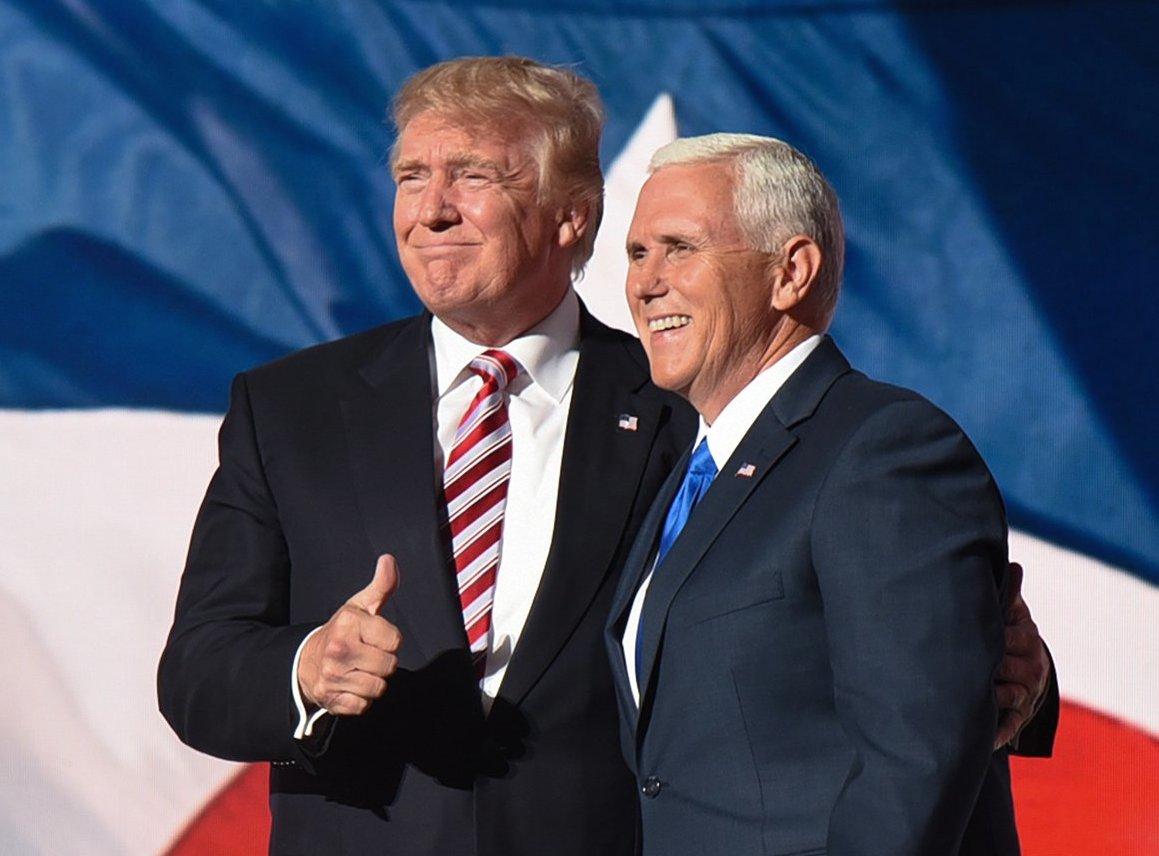
Donald Trump & Mike Pence (photo via @GOP)
Donald Trump’s nomination for President at the Republican National Convention in Cleveland was the culmination of a primary campaign that overturned precedent and defied expectations of the political class. Now, as he shifts his attention the general election, Trump has set his sights on another lofty goal, one which has been out of reach for Republicans for over two decades: winning New York, his home state.
Recent polls, voter enrollment data, and primary turnout patterns indicate that defeating presumptive Democratic nominee Hillary Clinton in New York would require near-unanimous support from both Republican and independent voters—a feat that Trump does not seem poised to accomplish.
Trump’s campaign announced in May that it will focus on 15 states in the general election, including traditional swing states like Ohio, Michigan, and Virginia, as well as Democratic strongholds like California and New York. Since then, Clinton has maintained a comfortable double-digit lead in New York polls, with the most recent from Quinnipiac University released on Tuesday giving her a 47 to 35 percent advantage - a slightly smaller margin than the prior poll, however. Election-modeling publication FiveThirtyEight gives Clinton a 97.1 percent chance of winning here.
But Trump and other members of his party seem undeterred by polling trends, instead touting his overwhelming win in the New York primary in April as evidence that the state is in play for the general election. Trump is clearly not to be underestimated, they say, and there are months until Election Day.
“If we carry New York by the margin we should, we will have changed American history...If you can break the city then you have the state,” former House Speaker Newt Gingrich said on Monday at a breakfast for the New York Republican delegation in Cleveland. Along with his primary success across the country, including in New York, Trump’s New York pedigree and presence in the city’s public life for decades appear to be giving him and his supporters added confidence.
“The win in New York really helped set the momentum,” Rep. Chris Collins, a Republican who represents the 27th Congressional District in Western New York and was the first member of Congress to endorse Trump, told State of Politics. “New York is in play.”
Collins refers to Trump’s decisive victory in the New York Republican primary, in which he received 60 percent of the vote and won every county but Manhattan, Trump’s home turf, which went to Ohio Governor John Kasich. This was a slightly larger percentage than Clinton - who also calls New York home - won in the Democratic primary, where she earned 58 percent of the vote while facing just one opponent (there were four Republicans on the ballot: Trump, Kasich, Ted Cruz and Ben Carson, who had dropped out before the vote).
Winning a vast majority of New York Republicans, however, will not be enough to secure a Trump victory here. Even though he won a higher percentage, Trump won half as many raw votes in the primary as Clinton, securing 525,000 to her 1 million. Had he secured 100 percent of Republican primary voters, Trump would still have trailed Clinton in New York primary votes.
As of April 1, there were 5.8 million Democrats and 2.7 million Republicans enrolled across the state, according to the New York Board of Elections, with New York City voters comprising 3.1 million of the Democrats and 460,000 Republicans. There are another 2.5 million “unaffiliated” registered voters, otherwise known as independents, and another 705,000 voters registered with smaller parties, like the Green Party or the Independence Party.
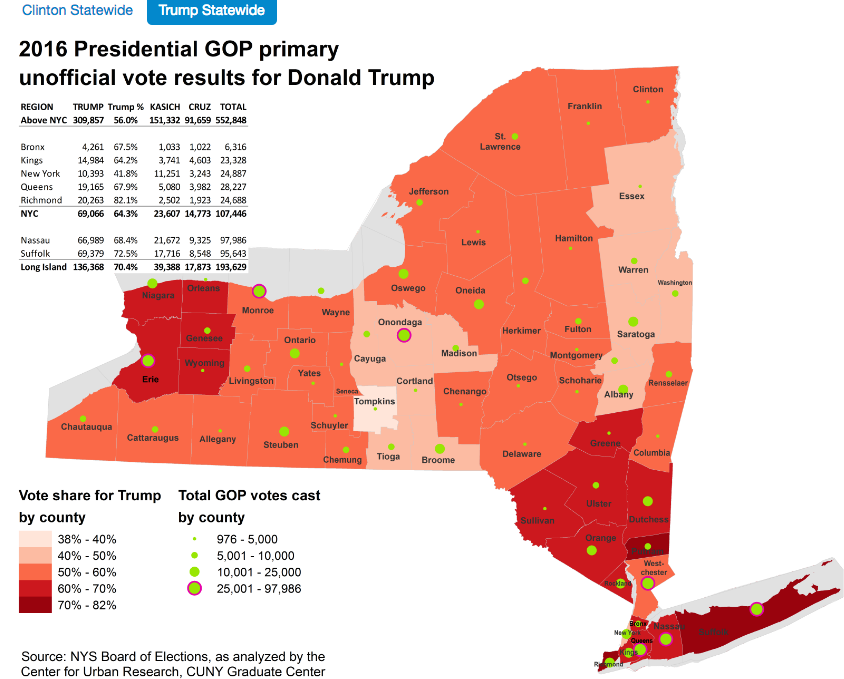 A total of 2.9 million New Yorkers voted in the presidential primaries this year (2 million Democrats and 922,000 Republicans). For a glimpse of the increase to anticipate in November, the last time there was a non-incumbent presidential election, in 2008, 7.6 million New Yorkers voted in the general election (4.8 million voted Democrat and 2.8 million voted Republican).
A total of 2.9 million New Yorkers voted in the presidential primaries this year (2 million Democrats and 922,000 Republicans). For a glimpse of the increase to anticipate in November, the last time there was a non-incumbent presidential election, in 2008, 7.6 million New Yorkers voted in the general election (4.8 million voted Democrat and 2.8 million voted Republican).
The Democratic enrollment advantage is expected to continue to favor Clinton this year as voter turnout surges for the general election, though Trump supporters are planning to attract many voters not registered as Republican. According to Steven Romalewski, mapping service director for the Center for Urban Research at the CUNY Graduate Center, the last time there were both Democratic and Republican primaries in New York, in 2008, the number of Republican voters jumped from 670,000 to 2.75 million between the primary and general elections, while Democratic voters lept from 1.9 million to 4.8 million voters.
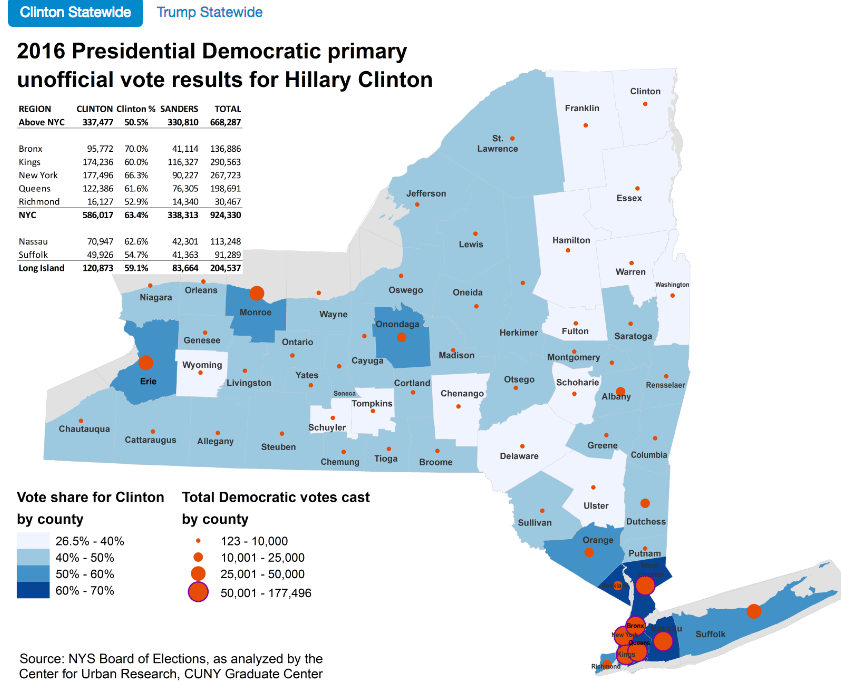 Romalewski said the increase in voters between the primary and general election was especially prominent within the New York City area. This does not bode well for Trump, who, according to the Quinnipiac poll, leads among upstate voters 48 to 36 percent, but is behind among New York City voters 63 to 20 percent. Trump and Clinton are neck-and-neck among suburban voters.
Romalewski said the increase in voters between the primary and general election was especially prominent within the New York City area. This does not bode well for Trump, who, according to the Quinnipiac poll, leads among upstate voters 48 to 36 percent, but is behind among New York City voters 63 to 20 percent. Trump and Clinton are neck-and-neck among suburban voters.
“If the turnout surges even by half the amount [it surged in 2008] from the primary to the general on the
Democratic side, it’s going to be really hard from a number of perspectives for the GOP side to overcome this,” Romalewski said in a phone interview with Gotham Gazette.
To win New York, Trump will likely need at least 2 million more voters than the 2.75 million Republican Senator John McCain received here in 2008—a total that Romalewski said would require winning all Republican-registered voters as well as nearly all independent voters. As of April 1, there were about 2.5 million unaffiliated, or independent, registered voters in New York, and new voters will be able to register until Oct. 14.
Trump and Clinton could, however, face a radically different electoral map than McCain, in part because of the unpredictable nature of this year’s election.
“It’s especially hard this year to look back for similar situations in presidential campaigns and kind of use those examples to predict or expect what might happen this time,” Romalewski said. “On the other hand, when you look at the math, it seems highly unlikely that the Republican candidate will be able to pull it out.”
To predict election outcomes, FiveThirtyEight uses an algorithm that weighs polling trends and demographic data. Its New York forecast begins with a strong Clinton lead indicated by polls which is then slightly widened when demographic data is taken into account. The website now predicts that Clinton will win about 54 percent of the vote in New York and that Trump will win 37.5 percent.
Currently, Trump’s progress to unite the bulk of non-Democratic New Yorkers has wavered according to polls. Trump performs poorly with independents in New York, as evidenced by Tuesday’s Quinnipiac Poll revealing a 41 to 35 percent advantage for Clinton among independents (most respondents said they did not know enough about Libertarian nominee Gary Johnson or Green Party nominee Jill Stein to support or oppose them).
Further, Trump has not yet won unequivocal support from Republicans—nearly 10 percent of Republican New Yorkers do not support him; five of the state’s 10 Republican U.S. Congressional Representatives have endorsed his bid for presidency. By contrast, all 18 Democratic Representatives and both Democratic Senators from New York have endorsed Clinton.
The last time a Republican presidential candidate won in New York was 1984, when incumbent President Ronald Reagan defeated Walter Mondale -- Reagan won every state but Mondale’s home state of Minnesota that year.
***
by Aaron Holmes, Gotham Gazette
@GothamGazette




